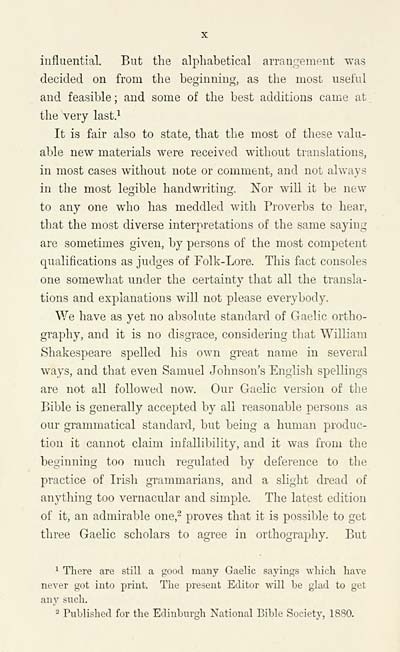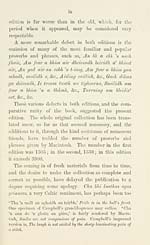Download files
Complete book:
Individual page:
Thumbnail gallery: Grid view | List view

influential. But the alphabetical arrriugenipnt was
decided on from the beginning, as the most useful
and feasible ; and some of the best additions came at
the very last.^
It is fair also to state, that the most of these valu-
able new materials were received without translations,
in most cases without note or comment, and not always
in the most legible handwriting. Nor will it be new
to any one who has meddled with Proverbs to hear,
that the most diverse interpretations of the same saying
are sometimes given, by persons of the most competent
qualifications as judges of Folk-Lore. This fact consoles
one somewhat under the certainty that all the transla-
tions and explanations will not please everybody.
We have as yet no absolute standard of Gaelic ortho-
graphy, and it is no disgrace, considering that William
Shakespeare spelled his own great name in several
ways, and that even Samuel Johnson's English spellings
are not all followed now. Our Gaelic version of the
Bible is generally accepted by all reasonable persons as
our grammatical standard, but being a human produc-
tion it cannot claim infallibility, and it was from the
beginning too much regulated by deference to the
practice of Irish grammarians, and a slight dread of
anything too vernacular and simple. The latest edition
of it, an admirable one,^ proves that it is possible to get
three Gaelic scholars to agree in orthography. But
^ There are still a good many Gaelic sayings which have
never got into print. The present Editor will be glad to get
any such.
2 Published for the Edinburgh National Bible Society, 1880.
decided on from the beginning, as the most useful
and feasible ; and some of the best additions came at
the very last.^
It is fair also to state, that the most of these valu-
able new materials were received without translations,
in most cases without note or comment, and not always
in the most legible handwriting. Nor will it be new
to any one who has meddled with Proverbs to hear,
that the most diverse interpretations of the same saying
are sometimes given, by persons of the most competent
qualifications as judges of Folk-Lore. This fact consoles
one somewhat under the certainty that all the transla-
tions and explanations will not please everybody.
We have as yet no absolute standard of Gaelic ortho-
graphy, and it is no disgrace, considering that William
Shakespeare spelled his own great name in several
ways, and that even Samuel Johnson's English spellings
are not all followed now. Our Gaelic version of the
Bible is generally accepted by all reasonable persons as
our grammatical standard, but being a human produc-
tion it cannot claim infallibility, and it was from the
beginning too much regulated by deference to the
practice of Irish grammarians, and a slight dread of
anything too vernacular and simple. The latest edition
of it, an admirable one,^ proves that it is possible to get
three Gaelic scholars to agree in orthography. But
^ There are still a good many Gaelic sayings which have
never got into print. The present Editor will be glad to get
any such.
2 Published for the Edinburgh National Bible Society, 1880.
Set display mode to: Large image | Transcription
Images and transcriptions on this page, including medium image downloads, may be used under the Creative Commons Attribution 4.0 International Licence unless otherwise stated. ![]()
| Early Gaelic Book Collections > Blair Collection > Collection of Gaelic proverbs and familiar phrases > (14) |
|---|
| Permanent URL | https://digital.nls.uk/76277444 |
|---|
| Description | A selection of books from a collection of more than 500 titles, mostly on religious and literary topics. Also includes some material dealing with other Celtic languages and societies. Collection created towards the end of the 19th century by Lady Evelyn Stewart Murray. |
|---|
| Description | Selected items from five 'Special and Named Printed Collections'. Includes books in Gaelic and other Celtic languages, works about the Gaels, their languages, literature, culture and history. |
|---|

